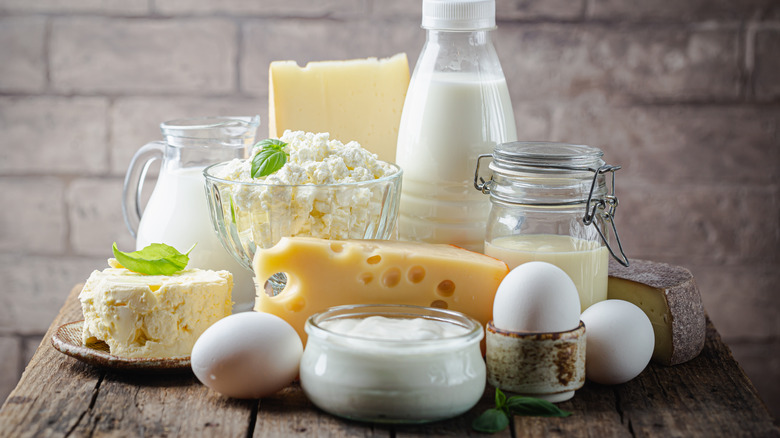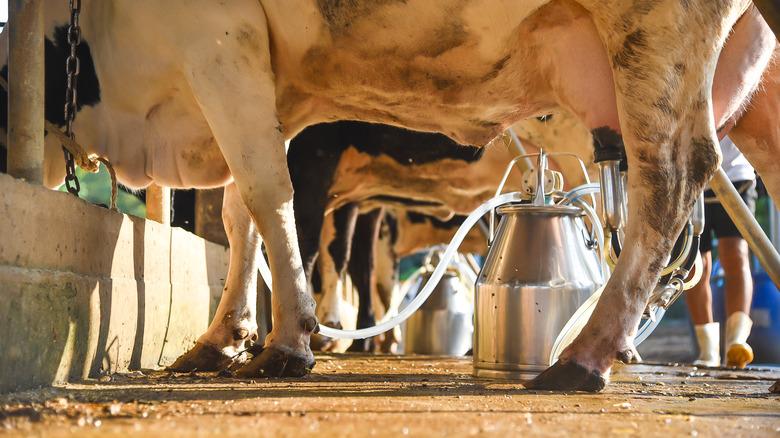New Study Links Dairy Consumption To Increased Prostate Cancer Risk
A new study published by Loma Linda University in Southern California found a startling connection between a ubiquitous grocery item and prostate cancer. The study, which was published in The American Journal of Clinical Nutrition, drew a troubling link between the deadly disease and one of the most prolific ingredients on the planet: milk.
According to Cancer.Net, prostate cancer is the second leading cause of cancer-related death in American men and the fourth most common cancer type in the world. An estimated 34,500 people will die from prostate cancer in 2022 in the U.S. alone, and nearly 270,000 Americans are expected to be diagnosed with the disease this year (via American Cancer Society).
In an effort to learn more about the causes of this pervasive disease, university researchers looked into potential dietary links to the cancer. The study, which began in 2001, monitored the diets of over 28,000 North American men over a five-year period and continued to track the health data of participants in the years following.
Study participants adhered to a variety of diets and consumed differing amounts of dairy, from non-vegetarians that consumed average American levels of dairy, to vegans who consumed no dairy products, to vegetarians who consumed about half the average amount of dairy. The overall findings indicated that there was a troubling potential link between cancer and dairy intake. "Men with higher intake of dairy foods ... had a higher risk of prostate cancer compared with men having lower intakes," the study found.
Dairy-rich diets could pose a greater cancer risk
"Our findings add important weight to other evidence associating dairy products, rather than non-dairy calcium, as a modifiable risk factor for prostate cancer," said Gary Fraser, professor at Loma Linda University School of Medicine and School of Public Health (via Loma Linda University).
According to researchers, the risk of developing the harmful cancer increased in tandem with dairy consumption. Participants who consumed just under 2 cups of dairy per day were found to have a 25% increased risk of developing prostate cancer compared to those who consumed more conservative amounts (around a half cup of milk per week).
Fraser noted that while the increase in risk was nominal with small increases in milk consumption, the biggest leap in cancer exposure occurred at a consumption level of two-thirds cup of milk per day, stating, "It's almost as if some biological or biochemical pathway is saturated at about two-thirds of a cup of milk per day." The type of dairy and milk fat percentages of the dairy consumed didn't appear to have a significant impact.
While subjects who reported the highest intakes of dairy were "more likely to have screened for prostate cancer," researchers also note that on average those subjects also had higher BMIs, ate more animal-derived meals, and consumed less vegetable-derived nutrients and foods. This data indicates that high dairy consumption could contribute to a generally less-healthful lifestyle, increasing the overall cancer risk, rather than being a direct cause of the disease.
Dairy consumption has also been linked to breast cancer
A past study conducted by researchers at the same university — which surveyed the diets and health stats of nearly 53,000 women in North America — also found a link between consumption of dairy milk and breast cancer, concluding with "fairly strong evidence" that even small amounts per day could be a cause of the common cancer.
"The parallels between our breast cancer in women paper a year ago and this paper relating to men, are striking," Fraser said (via Loma Linda University). "It seems possible that the same biological mechanisms are at work."
At the conclusion of the study, researchers clarified that data didn't suggest there was a link between non-dairy calcium (from foods like nuts, legumes, fruits, and seeds) and prostate cancer. Instead, "the risk of prostate cancer is causally associated with higher intake of dairy products or some unknown causal factor that is strongly associated with dairy intake."
Although it's unclear why — and even if — dairy milk significantly contributes to cancer risk, Fraser hypothesizes that the culprit might be the high levels of sex hormones contained in dairy milk (up to three-quarters of which is produced by pregnant cows). And while researchers can't yet say definitively that dairy is the root of the problem, they suggest those with existing risk factors for prostate cancer (such as a family history of cancer) should swap traditional dairy products for non-dairy alternatives as a precaution against the deadly disease.


